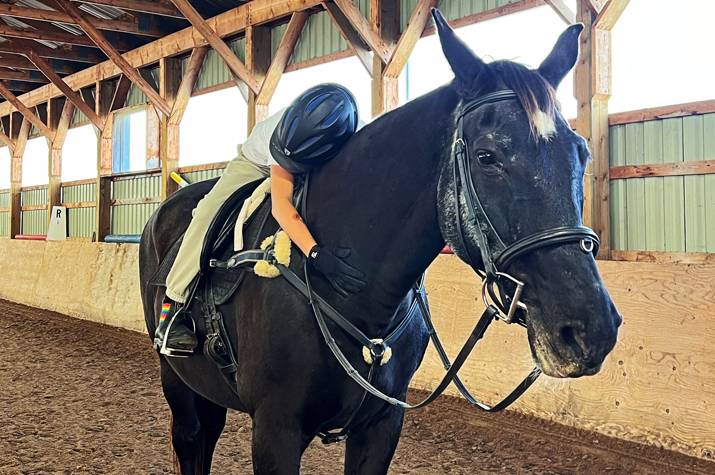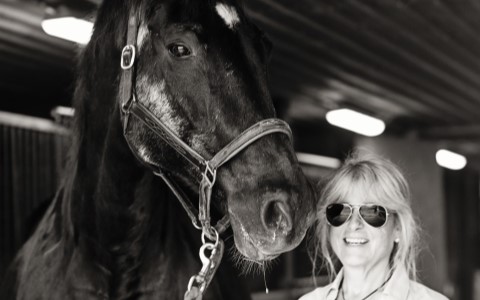Musical Ride horses find new pastures
By Rheanna Philipp

Former musical ride horse, Viper finds new purpose through therapeutic riding program.
Image by the Therapeutic Riding Foundation
May 1, 2025
Content
One year since the launch of the Divestment of Horses Program, dozens of Musical Ride horses have new homes. Rheanna Philipp, sat down with Sergeant Major Scott Williamson, riding master, to discuss two of the program's success stories. Listen to the audio story below to find out how young Olela and retired Viper are adjusting to their new homes.
Transcript – Audio story: Musical Ride horses find new pastures
Narrator: Welcome to the RCMP Gazette. We cover the latest topics on policing, offer tips on crime prevention and safety, and highlight the exceptional work of RCMP employees at home and abroad. Keep listening for our latest audio story.
Viper whinnies happily in his pasture at Tuff Therapeutic Riding Center. Hearing a familiar sound, he trots over to get a treat, his favourite, TIC TACs. He stands tall at about 17 hands, the base of his neck reaching nearly 5 and a half feet. A gentle giant ready to serve Canadians once again. Viper is a retired RCMP Musical Ride horse who had quite the career. In 2016 he travelled to Windsor, England to perform for the late Queen Elizabeth the Second. But at 23 years old it was time for him to retire.
Ellen Downey is the founder of Tuff Therapeutic Riding Foundation and has been working with the RCMP for the past 11 years. Prior to the divestment program Musical Ride horses were donated to registered therapeutic riding organizations, transferred through intergovernmental programs or sold in auction.
Ellen Downey: My relationship and partnership with the RCMP began a long time ago. We have been accepting and using horses for our therapeutic riding program. We help youth at risk with mental health issues. And your horses are fantastic because they're big. They adapt to their lives here and they're wonderful.
Narrator: The RCMP introduced the Divestment of Horses program in February of 2023. It was the first time members of the public were able to apply to own a Musical Ride horse. Sergeant Major Scott Williamson says the divestment program is set up give Musical Ride horses further opportunity to serve Canadians once they have finished their career with the ride. He says when the program first launched, they were overwhelmed with hundreds of applications but needed to rehome a few horses quickly, so he reached out to Ellen at Tuff. Viper is one of the horses Ellen received.
Ellen Downey: He is a gentle, gentle giant. Really wonderful personality. He takes things in a very sensible way which is quite helpful for us. He's a bit, we don't like to say it out loud, we like to spell it l-a-z-y but, in a good way because the horses really build the confidence for our kids and help them work through their emotional issues.
Narrator: Some of the children that come to Tuff have issues with emotional regulation. It can be quite daunting to get on a horse as large as Viper.
Ellen Downey: So, kids who have a hard time with emotional regulation get on a great big horse like Viper, and they have to think about how to regulate themselves emotionally and not get upset and not get mad but make a plan with this horse. And Viper is the perfect horse to do that because he wants to be their partner. He waits for them to tell him what needs to happen, and he's quite happy to stand around until that takes place. He's not anxious. He himself is very emotionally grounded. So, it really is wonderful to have a horse like that with our kids.
Narrator: RCMP horses are bred to be dependable and hard working. They begin training as early as age three and work every day for the rest of their careers.
Ellen Downey: I think what I've learned over the years about the RCMP horses and the partnership with Tuff is the horses like to have a job. The RCMP horses have had a career where they've worked every day and they want to continue working, but they maybe can't work as hard as they've been working. So, my program offers them the opportunity to keep working and to do a lot of wonderful healing.
Narrator: Tuff works with a diverse group of at-risk youth in Ontario. Some of the children that Viper works with were victims of human trafficking.
Ellen Downey: It's kind of a full circle, to feel like the RCMP go out as an agency and, you know, find the people who are doing this and, you know, help these kids and then their horses heal the victims. And that's, that's a pretty wonderful full circle.
Narrator: Williamson says a lot of the horses that go through the divestment program are rehomed to therapy riding programs across the country. He says it is special that these horses are able to continue to give back to Canadians after serving them for so long. About 75 per cent of the horses that go through the divestment program have completed their career are now retired. They are still rideable but older in age and need a less strenuous environment than the Musical Ride. The other 25 per cent are younger horses that are unable to complete their training due to medical issues. Olela falls into that category. She is the newest edition to the Veterinary program at Seneca Polytechnic. Kate Shore is an animal health technician at Seneca Polytechnic and the person responsible for submitting the divestment application for Olela.
Kate Shore: So, we have kind of specific needs versus other people that would be applying for, or buying a horse. Our horse doesn't have to be rideable, which is kind of number one why they thought that Olela would be good for us, because she shouldn't really be ridden anymore.
Narrator: Almost 7 years old Olela is a young horse. While she was in training for the Musical Ride troop, veterinarians discovered that she suffers from a condition called a kissing spine.
Kate Shore: So, they're born with it, and sometimes it can show up at different stages in their career, depending on the severity. And basically, two of at least two of their dorsal vertebrae in their thoracic vertebrae, or dorsal spinous processes in their thoracic vertebrae are touching, and that causes discomfort in their back is the main symptom.
Narrator: In simpler terms, a kissing spine is a condition that causes chronic discomfort and sharp pain when being ridden. In Olela's case her discomfort happens to be exactly where a rider would sit in a saddle.
Kate Shore: I think for her job as an RCMP Musical Ride horse, it would have been a pretty strenuous job for her, especially with that issue. It just, they thought that it wasn't going to work for her in the long term and they didn't want to, kind of, worsen her pain by just pushing her training. So, they decided to retire her at a pretty young age of almost seven. And after she's been here, since she doesn't have that stressor of a rider on her back, she's quite comfortable. And she's living her best life.
Narrator: Olela was prescribed an anti-inflammatory drug to ease her pain when she arrived at Seneca's veterinary clinic. Since her arrival she has been slowly weaned off.
Kate Shore: So, she's not on any meds anymore, and she's just living her best life outside and she's living out in the rain and doing really well. And she's all muddy. And she's being a horse, which is awesome.
Narrator: Olela now works as a teaching horse. She works in medical labs where students can practice blood withdrawal and bandaging. Students also work on their handling and daily care.
Kate Shore: So, they put her halter on some better than others because they have limited horse experience, but she's very patient and they bring her inside. She gets her grain inside and then she goes back out for the day with her buddies and her life is pretty relaxed.
Narrator: Both Viper and Olela can now give back to Canadians in new ways, where they were no longer able to with the Musical Ride. Not only do the horses in the divestment program go to educational and therapeutic programs, but many go to individuals across the country. Williamson says the Musical Ride is about Canadians and their love for the ride and now they can own a piece of Canadian heritage. Thanks for listening to the RCMP Gazette's latest audio story. This story was written and narrated by myself, Rheanna Philipp. Special thanks to the RCMP Digital Production team for producing the story.
In February 2023 the RCMP introduced the first of its kind Divestment of Horses Program, allowing members of the public to apply to own a Musical Ride horse. Surplus horses that no longer meet the Ride's requirements due to age, health or other reasons are eligible for donation.
"The Divestment Program is set up to allow for better opportunity for our horses that go through their natural life cycle within the Musical Ride, to then have further opportunity outside of the Ride," says Sergeant Major Scott Williamson.
Since its launch, the program has successfully rehomed dozens of horses. Williamson says that the "most special part" of the program is that many horses go to therapeutic riding programs.

"It allows the horses to continue to give back to Canadians after serving them for so long," says Williamson. "Now they get to continue giving back to Canadians coming from hard times."
Before the program, the Musical Ride donated horses to registered therapeutic riding organizations, or sold the surplus horses in auction. The RCMP reinvests all proceeds collected from auctions into the Ride's breeding program. While horses are still sold at the RCMP Musical Ride horse Auction, they are not the same horses as those eligible for the divestment program.
There are strict requirements that horses must meet to qualify for the Musical Ride. They must be between 16 and 17.3 hands, have a black coat and a manageable temperament suitable for riding. The horses that come out of the breeding program that don't meet these requirements are then sold at the auction.
These horses are still capable of working in the sport horse industry unlike the horses that go through the divestment program.
Life after the Ride
Horses selected for the divestment program are considered unfit for the Musical Ride and Equitation Training for a variety of reasons. Williamson says roughly 75 per cent are retired musical ride horses that need a less intense working environment.
"The other 25 per cent are younger horses that have developed a medical issue and can't continue with our level of riding and training," says Williamson.
Care for the horses is a top priority for the Musical Ride, so only the most qualified candidates are screened through the application process. The main goal of the Divestment of Horses program is to match each horse to the best home, based on the respective needs of each horse.